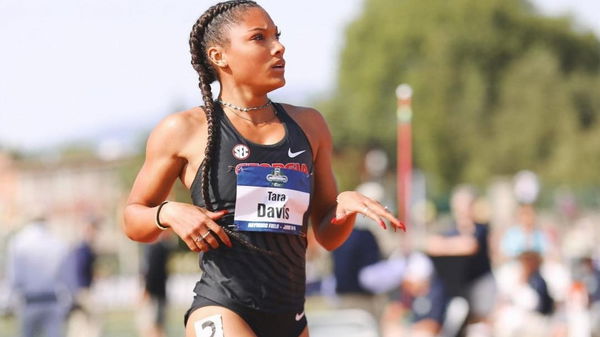

A recent war of words from Tara Davis-Woodhall directed towards Michael Johnson has ignited a firestorm in the track and field world. A new debacle has made its way into a realm where athletes are constantly trying to push the limits of their sport. Months after her dominant triumph in the City of Love, Davis-Woodhall finds herself at the center of a heated debate in her beloved sport. And at the heart of the controversy is Johnson’s assertion that tracks, specifically the running events, need ‘saving’.
On November 27, Johnson, a four-time Olympic champion, shared his vision for revitalizing athletics with the BBC. From the conversation he had, one comment made waves as Johnson claimed, “I think I can save track, but I don’t think I can save track and field.” His emphasis on saving ‘track’ instead of ‘track and field’ as a whole sparked a wave of reactions across the athletic community. Among those voicing their dissent was Davis-Woodhall, who took to Instagram the following day to call out Johnson, stating, “My sport doesn’t need saving at all.”
ADVERTISEMENT
Article continues below this ad
Olympic track star stands by Tara Davis-Woodhall after her bold clapback
The infuriated athlete stated, “Michael, you’re ruining the sport if you’re trying to ‘save’ just track.” Moreover, Tara passionately defended the importance of field events and added, “The field events actually do have a lot of impact to the sport.” Taking further digs, Davis-Woodhall boldly commented, “You’re long gone. Your time has passed. If you wanted to change the sport, you should have changed it a long time ago. Instead, you were skipping out of the sport.”
Tara’s husband, Hunter Woodhall, too, did not delay in taking his wife’s side. Echoing her sentiment, he too dismissed Johnson’s comments as inflammatory and irrelevant. “Michael Johnson is such a self-important joke. Bro, we don’t need you to save anything,” Hunter remarked in the comment section of an Instagram post. The long jumper’s candid remarks, however, sparked a mixed reaction from fans. While many applauded her courage, others accused her of being overly critical. The online backlash was intense, with some labeling her stance as “illogical.” Yet Davis-Woodhall chose to remain unshaken and concentrated on spending quality time with her family during Thanksgiving.

However, now, amid all the ongoing debates, Tara’s criticism found an ally in another sprint phenom of the U.S. World-class sprinter, Christian Coleman, who took to his Instagram account and mocked Johnson’s remarks. Coleman shared Johnson’s comment on his story and captioned it “Loll”. Coleman’s comment seems to add weight to Davis-Woodhall’s argument. Moreover, subtly a growing divide can be noticed within the track and field community about Johnson’s controversial vision for the sport. And it’s not just the Woodhall couple or Coleman who has been left unsatisfied, but also America’s very own Noah Lyles doesn’t seem very satisfied with Johnson’s initiative of Grand Slam Track.
What’s your perspective on:
Tara Davis-Woodhall vs. Michael Johnson: Who's right about the future of track and field?
Have an interesting take?
Noah Lyles calls out Michael Johnson’s Grand Slam Track for lack of media power.
Noah Lyles, the reigning Olympic sprint king, is no stranger to speaking his mind. From addressing the glaring issues of underfunding in track and field to advocating for better athlete representation, Lyles has been a consistent voice for change. So when Grand Slam Track, by the legendary sprinter Michael Johnson, promised to revolutionize the sport with massive prize pools, one would assume Lyles would be on board. But instead, the fastest man alive has aired his doubts about its most glaring flaw. It is the lack of media clout.
ADVERTISEMENT
Article continues below this ad

ADVERTISEMENT
Article continues below this ad
In a recent interview with LetsRun.com, Lyles stated with a note of skepticism, “(Grand Slam Track is) still in the same position (with me) as it has been all year.” Stating the reason behind his thought, Lyles further continued, “I’ve already come in with a lot of accolades and a lot of things where I don’t need monetary value, but I really need marketing value.” Lyles argues that the league’s inability to guarantee widespread visibility undermines its potential impact. Sharing his personal opinion, Noah addressed how even the most well-funded league could fail to elevate the sport’s profile without proper exposure and coverage.
Lyles’ critique touches on a larger issue in professional athletics. He highlights the delicate balance between financial incentives and market visibility. While Grand Slam Track boasts a $30 million investment and plans to stream via platforms like Citius Mag’s YouTube channel, these efforts fall short of the media partnerships needed to transform athletes into global icons. While Johnson aims to give track athletes the value and recognition they deserve, it has also been dealing with a lot of challenges and controversies. Can Johnson’s Grand Slam Track truly revolutionize track and field without solving its visibility problem? Share your thoughts with us in the comment section.
ADVERTISEMENT
ADVERTISEMENT
ADVERTISEMENT
ADVERTISEMENT


Tara Davis-Woodhall vs. Michael Johnson: Who's right about the future of track and field?